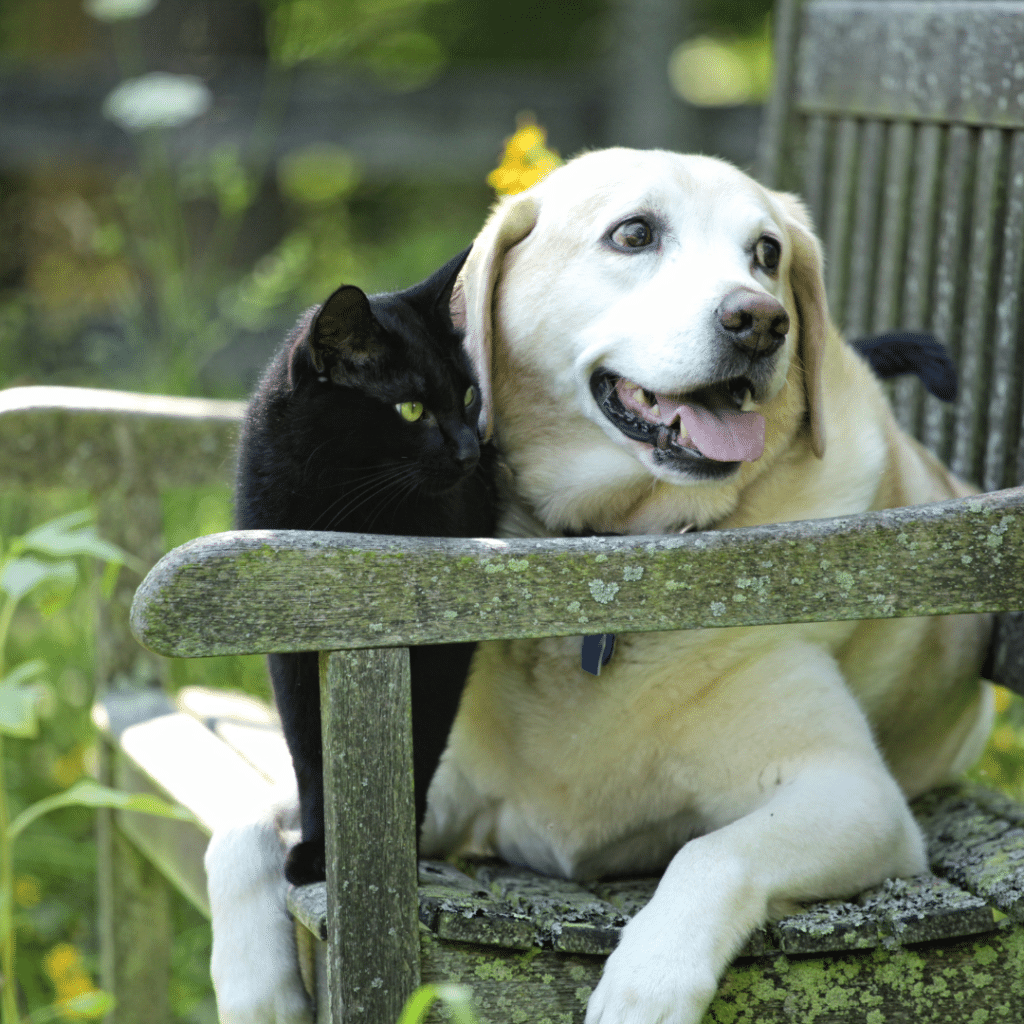Share This Blog With Other Pet Parents!
Understanding Canine and Feline Cognitive Dysfunction: Navigating Dementia in Pets
Are you noticing changes in your senior pet’s behaviour that seem out of the ordinary? It could be more than just old age. Canine and feline cognitive dysfunction, often referred to as pet dementia, can affect our furry companions as they age.
In this comprehensive guide, we’ll explore how to recognize the symptoms of cognitive dysfunction in dogs and cats and provide expert tips for managing these symptoms effectively. From understanding the progression of cognitive decline to exploring treatment options, we’ll help you navigate the challenges of caring for an ageing pet. Stay tuned as we delve into strategies to ensure your furry friend’s golden years are as comfortable and fulfilling as possible.
What you’ll learn from this blog:

For all you need to know, download our
FREE Dental Guide

This blog is part of our Proactive Pet Parent series! This is just the beginning… To see more blogs, click here! Better yet, sign-up to our newsletter to receive these directly to your inbox each month.
Sign-up To The Proactive Pet Parent Newsletter
Understanding Canine Cognitive Dysfunction
Canine cognitive dysfunction (CCD) is a condition similar to Alzheimer’s disease in humans and is prevalent among ageing dogs. As our canine companions grow older, their brain function may decline, leading to changes in behaviour and cognitive abilities.
Common symptoms of CCD include disorientation, confusion, and changes in sleep patterns. For instance, your once-prompt pooch may start forgetting familiar routes during walks or have difficulty recognizing family members. These subtle yet concerning signs can disrupt your dog’s daily routine and impact their overall quality of life.
As a pet owner, it’s crucial to recognise these symptoms early on and take proactive measures to support your dog’s cognitive health. By providing a stimulating environment, maintaining a consistent routine, and offering appropriate nutritional support, you can help alleviate symptoms and enhance your dog’s well-being.
Additionally, regular veterinary check-ups can aid in monitoring your dog’s cognitive function and adjusting treatment plans as needed. By understanding the complexities of canine cognitive dysfunction and implementing targeted interventions, you can ensure that your furry friend enjoys their senior years to the fullest.
Recognising Feline Cognitive Dysfunction
Feline cognitive dysfunction (FCD) is a condition that commonly affects senior cats, impacting their cognitive abilities and overall well-being. Unlike dogs, cats may exhibit more subtle signs of cognitive decline, making it challenging for pet owners to recognise the symptoms.
Typical signs of FCD include:
- changes in litter box habits, such as urinating outside the box or forgetting to bury waste.
- excessive vocalisation and altered grooming patterns.
- Your once-independent kitty may become more clingy or exhibit signs of anxiety as they struggle to navigate their environment.
These behavioural changes can be distressing for both you and your feline friend, but early detection is key to managing the condition effectively. By observing your cat’s behaviour closely and noting any deviations from their usual routine, you can help identify potential signs of cognitive dysfunction. Consulting with your veterinarian for a thorough evaluation can provide further insight into your cat’s cognitive health and guide treatment options.
With patience, understanding, and proactive intervention, you can support your senior cat’s cognitive function and ensure they enjoy a comfortable and fulfilling life in their golden years.
Managing Symptoms in Dogs
Managing symptoms of cognitive dysfunction in dogs requires a multifaceted approach to address their changing needs and behaviours. Here are some things you can do:
- Establishing a consistent daily routine can provide a sense of stability for your furry companion, reducing anxiety and confusion.
- Incorporating mental stimulation activities, such as puzzle toys or interactive games, can help keep your dog’s mind engaged and prevent cognitive decline.
- Providing a comfortable and safe environment is essential, with cosy bedding and easily accessible water and food bowls.
- Nutrition also plays a crucial role in supporting cognitive health, so opting for a balanced diet rich in antioxidants and omega-3 fatty acids can help nourish your dog’s brain.
- Additionally, consider incorporating supplements specifically formulated to support cognitive function, such as those containing antioxidants like vitamin E or omega-3 fatty acids like DHA.
- Regular veterinary check-ups are essential for monitoring your dog’s cognitive health and adjusting treatment plans as needed.
With patience, dedication, and proactive care, you can help manage your dog’s symptoms of cognitive dysfunction and ensure they enjoy a happy and fulfilling life by your side.
Managing Symptoms in Cats
When it comes to managing symptoms of cognitive dysfunction in cats, a tailored approach is essential to address their unique needs and behaviours. Here are some things that may help:
- Environmental enrichment plays a crucial role in stimulating your senior cat’s mind and preventing cognitive decline. Invest in interactive toys, scratching posts, and vertical spaces to encourage physical activity and mental engagement.
- Creating designated safe spaces within your home where your cat can retreat and relax can help alleviate stress and anxiety.
- Additionally, consider modifying your cat’s feeding routine by offering smaller, more frequent meals to encourage appetite and hydration.
- Providing a consistent daily routine can offer a sense of security for your feline friend, minimising confusion and disorientation.
- Supplements containing antioxidants and omega-3 fatty acids may also support cognitive function in cats, so consult with your veterinarian to determine the most appropriate options for your pet.
- Regular veterinary check-ups are essential for monitoring your cat’s cognitive health and adjusting treatment plans as needed.
By incorporating these strategies into your cat’s care routine, you can help manage their symptoms of cognitive dysfunction and ensure they enjoy a comfortable and fulfilling life in their senior years.
Emotional Support for Pet Owners
Caring for a pet with cognitive dysfunction can be emotionally challenging for pet owners. Witnessing your once-vibrant companion struggle with cognitive decline can evoke feelings of sadness, frustration, and helplessness.
It’s essential for pet owners to prioritise their own emotional well-being while caring for their furry friends. Seek support from friends, family members, or online communities who understand what you’re going through. Talking openly about your feelings and experiences can provide catharsis and reassurance that you’re not alone on this journey.
Additionally, consider seeking professional guidance from a therapist or counsellor who specialises in pet loss and grief. Engaging in self-care activities, such as exercise, meditation, or spending quality time with your pet, can help alleviate stress and promote emotional resilience.
Remember to celebrate the small victories and cherish the moments of joy you share with your furry companion. By prioritising your emotional needs and seeking support when needed, you can navigate the challenges of caring for a pet with cognitive dysfunction with strength and compassion.
Looking Toward The Future
Understanding and managing cognitive dysfunction in our pets is a multifaceted endeavour that requires compassion, patience, and proactive care. As we navigate the complexities of cognitive dysfunction in our pets, it’s natural to contemplate what lies ahead.
We can take steps to ensure the best possible outcomes for our furry companions. Embracing a proactive approach to pet care that encompasses physical, mental, and emotional well-being can lay a solid foundation for their future health and happiness. By staying informed about advancements in veterinary medicine and cognitive health research, we can adapt our caregiving strategies to meet our pets’ evolving needs.
As always, if you have any questions for the veterinary team at MustCare, please get in touch with us today.
